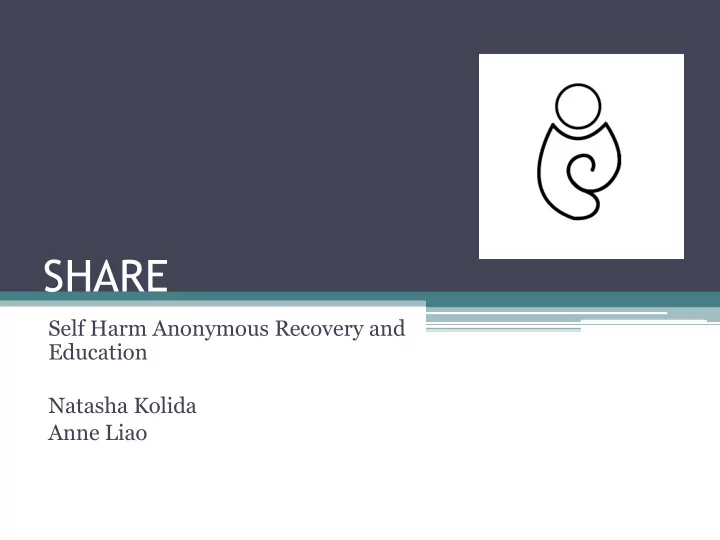

SHARE Self Harm Anonymous Recovery and Education Natasha Kolida Anne Liao
Who we are
Mission • To provide non- judgemental support for self- harm recovery • To educate the public about self-harm and promote self care • To encourage the creation of SHARE groups in local communities
The Self-Hug
How it began… • Lack of resources for self-harm/self-injury • Ignorance of self-harm in general public • Lack of/poor education about self-harm even among mental health professionals • Desire for self-harm specific peer support • Stigma, frustration, need for change
Levels of Prevention
SHARE Meetings • Harm reduction model • Recovery oriented • Our definition of self harm • Peer-led • Confidential • Weekly • Still in the works: ▫ Sponsor/Buddy system? ▫ Accompaniments for medical attention
SHARE Meetings - Guidelines • There is no obligation to share, you can simply “exist” • Speak from personal experience, we cannot recommend one method of recovery over another • Respect that everyone brings unique experiences • Be aware that your peers may be at a different stage of recovery than you • If you have fresh injuries (cuts/burns etc.), please do cover those up as they can be triggering, scars are okay, because they are part of who we are • Please do not share pictures of your injury as that may be a trigger for others • If you need to share graphic descriptions, please always warn that it may be triggering beforehand, be mindful of your own headspace and others • Bringing weapons to group will not be tolerated, you will be asked to leave • Zero tolerance policy – if you attend under the influence of substances (alcohol and illicit drugs), you will be asked to leave
SHARE Meetings - Facilitators • Lived Experience with self-harm • Training ▫ QPR ▫ Really? ▫ MHFA (Youth) ▫ CMH Peer Buddy Training (modified)
SHARE Meetings - Structure • 5 minute mindfulness activity ▫ Eg. 5-4-3-2-1; Guided Meditation • Check-in/share • Free Flow/Questions • Wrap-up activity ▫ Eg. Successes/Positive Feelings
Primary – Self-Care Education • Mental health maintenance • Encourage flourishing individuals • Promote and teach self-care • Prevent development of negative coping mechanisms and poor health
Secondary – Early Intervention • For people showing early signs of distress and negative coping and those who are in recovery from self-harm – prevent self-harm • Provide info and/or referrals to resources • Offer stress management programs and opportunities
Tertiary – Support • For population w/ history of self-harm (with or without pre-existing disorder) to find peer support • Complement professional support • Help work towards improving/optimizing health • Harm-reduction and recovery • Empowerment through peers
As an organization • Target Population: Youth 10-29 ▫ 10-12 – Primary ▫ 13-18 – All levels ▫ 19-end of post-secondary – All levels ▫ 22-29 – Primary & Secondary
Levels of Prevention
Questions/Feedback?
Recommend
More recommend